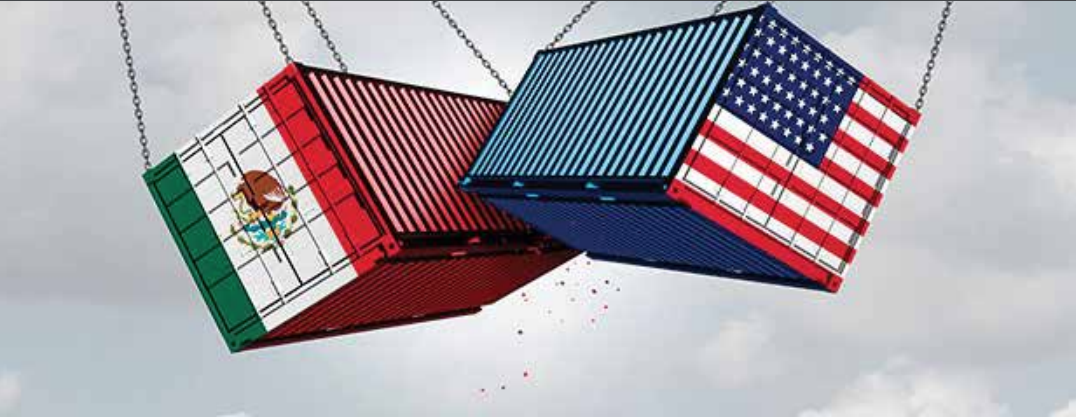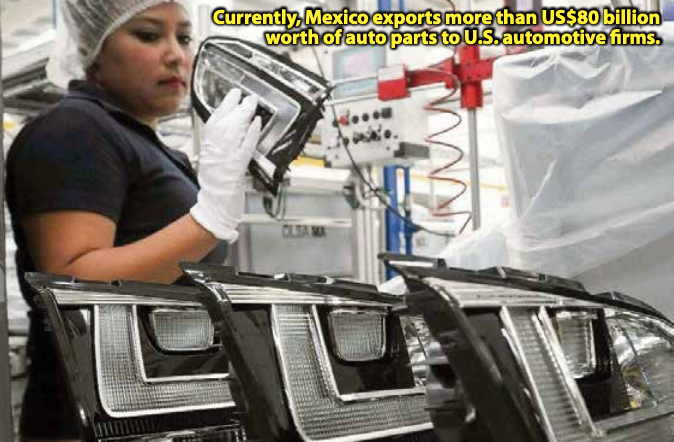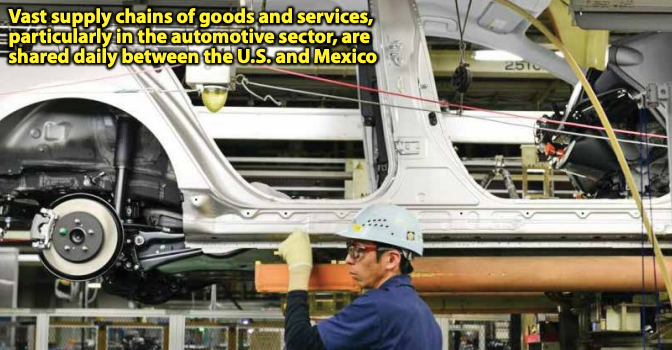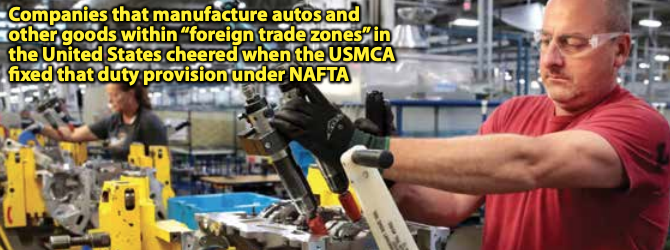Business Community Rejects Import Tax on FTZ

By Wendy Fry
Some border business groups are urging Congress not to reimpose an import tax on products made in congressionally authorized foreign trade zones, claiming lawmakers would be reinstating a duty provision that previously put them at a disadvantage under NAFTA.
The change is being discussed as part of a United States-MexicoCanada Agreement (USMCA) technical corrections package that could be included in the larger federal end-of-the-year omnibus spending bill. That spending bill is still being negotiated by U.S. lawmakers.
Technical corrections bills are typically non-controversial and pass Congress by unanimous consent, but a bipartisan coalition of U.S. lawmakers is opposing this particular technical change to the USMCA, which went into effect on July 1 and replaced NAFTA.
The Congressional Budget Office estimated the new provision would be the equivalent of a $2 billion tax increase for companies that operate within the foreign-trade zones.
“This relic from the original NAFTA should not be reinstated,” said Britton Mullen, the president of the Border Trade Alliance.
Much of the new United StatesMexico-Canada Agreement simply updated the defunct North American Free Trade Agreement, with new laws on intellectual property protection, the internet, investment, state-owned enterprises and currency.
But the 2,082-page pact also included significant changes in several key areas, including incentives to make cars in North America.
The deal, as it was approved before the proposed technical correction, also made foreign investment in Mexico more attractive, specifically because of the rules of origin in the automotive industry, which required a certain percentage of components being manufactured in the region for a vehicle to be free of tariffs.
It would have likely encouraged more auto parts production in Mexico, but U.S. Trade Representative is seeking to undo that advantage by revising the USMCA with this technical revision, business groups on both sides of the border said midDecember.
Some business groups claim the proposed revision to the USMCA would weaken U.S.-based manufacturers, making them less globally competitive, and erode the economic power of the country’s foreign trade zones.

Foreign-trade zones are secure areas under the supervision of U.S. Customs and Border Protection (CBP) that are considered outside the customs territory of the United States for the purposes of duty payment.
In the San Diego border region, 68 companies employ around 4,000 employees importing between US$50 million and US$75 million worth of merchandise a year that falls under the foreign-trade zone regulations that would be changed if the proposed amendment is approved by Congress.
“The tax would be counterproductive to our goals of facilitating and protecting crossborder trade. If instated, we would lose a competitive advantage of USMCA that we spent so much time and effort to secure. And, it is an advantage that Mexico and Canada would still enjoy,” said a spokeswoman for the San Diego Regional Chamber of Commerce.
In the city of El Paso, as another example, 69 companies import US$10 million worth of products, such as auto parts and other merchandise that would be impacted under the change, according to a 2018 report.
Under NAFTA, Canada and Mexico could export auto and other goods into the U.S. without paying the import duties as long as they followed the trade agreement’s “rules-of-origin,” which said how much of the end product could be made from regional parts. Finished goods made within the U.S. foreign trade zones could not qualify for this duty-free treatment, even if manufacturers in the zone adhered to the same rules.
When the new trade deal, USMCA, went into effect on July 1 and replaced the 24-year-old NAFTA, it effectively repealed that provision. U.S. Trade Representative Robert Lighthizer is seeking to reinstate it into the trade package as part of the technical corrections bill.

Currently, Mexico exports more than US$80 billion worth of auto parts to U.S. automotive firms.
Lighthizer, 73, has praised U.S. President Donald Trump’s “America First” trade stance. He said it changed the objective of the country’s trade policy “from servicing corporations who do business overseas to try to drag, or lure, more manufacturing back to the United States.”
But economic data shows job growth in the U.S. manufacturing sector had slowed to a trickle even before nationwide coronavirus shutdowns pushed millions out of work.
Lighthizer said the new trade deal that he negotiated requires automakers to source more of their components in the United States. The change Lighthizer is now seeking would require firms operating in foreign-trade zones to pay more tariffs on components sourced from countries other than Canada or Mexico.
Lighthizer said this correction could allow for a future technical correction that would allow companies to receive a refund, as they did under NAFTA, on merchandise processing fees charged by Customs and Border Protection.
Currently, there are approximately 195 active free trade zone programs across the United States, employing 440,000 people at approximately 3,300 businesses, according to a 2018 report made to Congress. Some of those are companies that bring goods into free trade zones at regional hubs and distribute them across the U.S.
Manufacturing accounts for about 63 percent of free trade zone import activity, which totaled almost US$800 billion in 2018. The biggest category of imports under the program is oil. Next largest are vehicle parts, consumer electronics, pharmaceuticals and machinery and equipment.
Foreign-brand automakers use the program to import parts from Europe and Asia to assemble in the border region, according to the 2018 report to Congress.
Manufacturers get cost benefits from operating in the zones like delaying payments of duties, but under the old trade agreement, they do eventually have to pay applicable import duties, which is what caused the problem under NAFTA.
Companies that manufacture autos and other goods within “foreign trade zones” in the United States cheered when the USMCA fixed that duty provision under NAFTA. But now, just months after the new trade deal took effect, those same businesses are worried U.S. lawmakers will revert back to the previous restrictions, upon the advice of Lighthizer.
“USMCA is a trade agreement for the 21st century, but reinstating an old NAFTA-era rule turns back the clock on U.S. manufacturing competitiveness,” said Border Trade Alliance Chair Sergio Contreras. “In keeping with the goal of modernizing U.S. trade policy under USMCA, products produced within foreign trade zones should qualify for dutyfree treatment.”
Free-trade and foreign-trade zones (sometimes called FTZs) were created for the purpose of expediting and encouraging foreign commerce. The zones are dutyfree areas created where goods can be rapidly shipped, repackaged, relabeled, or manufactured further and re-exported without customs authorities stepping in.
Vast supply chains of goods and services, particularly in the automotive sector, are shared daily between the U.S. and Mexico amounting to approximately US$1.7 billion in daily trade.

“Supporting such a tax increase during a global pandemic and economic recession would harm American manufacturers across a wide range of industries, including the energy, electronics, automobile, and pharmaceutical sectors, among others,” a bipartisan group of Senators wrote in a Dec. 1 letter to Lighthizer.
“Reinstating this provision would prevent the nearly 500,000 workers and their employers operating on U.S. soil in FTZs from receiving the same reduced tariff benefits as their counterparts in Canada and Mexico,” the letter stated.